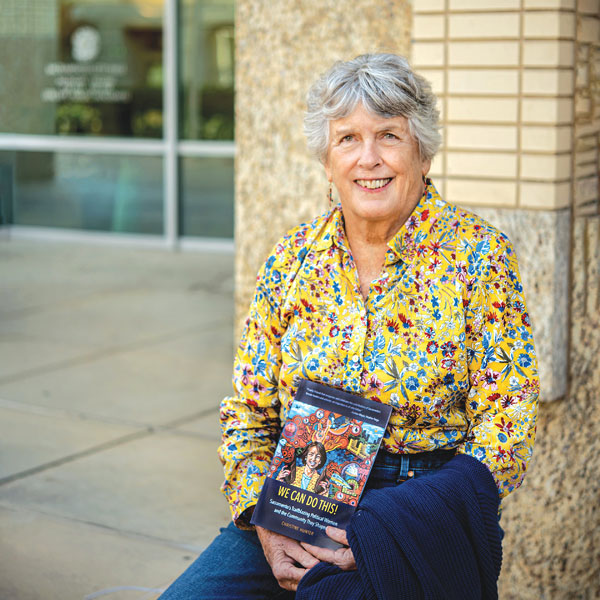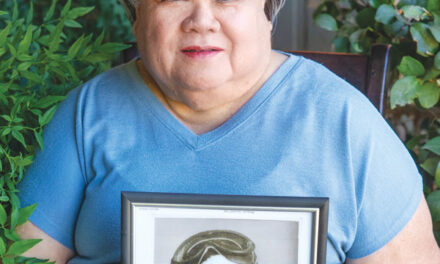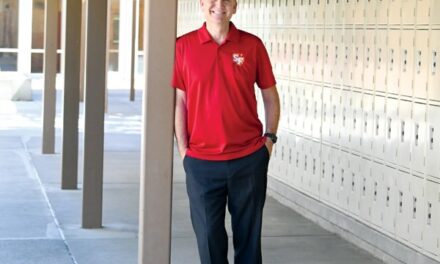The future may be female, but author Christine Hunter is here to remind us so was the past.
Hunter’s new book, “We Can Do This! Sacramento’s Trailblazing Political Women and the Community They Shaped,” released last year, profiles dozens of women who led Sacramento from the 1970s into the 2000s.
The names are locally renowned: Anne Rudin, the city’s first elected female mayor; Kim Mueller, former City Council member and now a federal judge; and Lauren Hammond, the first Black woman elected to the City Council.

Proceeds from the book’s sales benefit the Anne Rudin Scholarship Fund administered by the League of Women Voters of Sacramento. The fund helps young women pursue higher education in public administration and public policy.
“I’d like to inspire younger women to see the possibilities in a positive light for being active in government,” says Hunter, a trailblazer in community relations. “I want these young women to see whose shoulders we stand on and what they had to overcome—impediments to freedom in the ’50s, ’60s and ’70s like not being allowed to have credit on their own, having to co-sign contracts with a man and endless other ways women were disappeared.”
In a series of interviews, Hunter examines what these local women went through to gain footholds—sometimes literally. The cover, painted by Hunter’s great-granddaughter Jasmine Moffett from a photo in the book, depicts Mueller holding a pair of shoes with holes in the soles from countless miles walked during her 1987 City Council campaign.
Hunter traveled countless miles, literally and figuratively, to create her book. The Yuba City native was exposed to politics early when her mother served as president of the League of Women Voters in the late 1950s.
A shy, artistic girl, Hunter attended California College of Arts and Crafts and earned her master’s in printmaking at Sacramento State. Her dream was to be a college art instructor, but when Proposition 13 passed in 1978 and stripped schools of arts funds, she fought an uphill battle to remain employed.
While her white male counterparts landed full-time teaching positions, she struggled to string part-time jobs together.
She was “hurt and disappointed,” but Hunter threw her energy into the newly founded Environmental Council of Sacramento. She found her voice as a volunteer lobbyist and spokesperson for the group and was appointed to the Sacramento Planning Commission, which launched her new career.
While on the commission and later as a consultant, she worked to bring Sacramento’s 18-mile light rail starter line into existence.
In what Hunter calls “the heyday” of the late 1970s and early 1980s, she met many fascinating women through her involvement with organizations such as the economic council, American Association of University Women and American Lung Association.
When some of these older intrepid female leaders began to die, Hunter realized something had to be done to preserve their stories.
“There’s not much ink given to women in terms of writing history,” the Arden Arcade resident says. “I wanted to do it.”
Next came a five-year process of interviews, writing and research to capture the stories of Rudin, Lynn Robie, Illa Collin and others, including former mayor Heather Fargo, who wrote the last chapter.
“Having Heather write the final chapter helped it come full circle,” Hunter says. “It communicates to younger women considering being active in local government, ‘Here are resources. Get on planning commissions, local planning boards and committees and work your way up and see if you’re suited for this.’”
To make the book accessible, Hunter has arranged to have copies available through the Sacramento Public Library, Los Rios Community College District and Sacramento County Office of Education, which placed 60 copies in local high school libraries for the next generation of trailblazing women to savor.
For more information, visit wecandothissacramento.com.
Jessica Laskey can be reached at jessrlaskey@gmail.com. Follow us on Facebook, Twitter and Instagram: @insidesacramento.
















